Colombia’s Foreign Minister, Luis Gilberto Murillo, has set a firm deadline for recognizing Venezuela’s recent presidential election results.
The Colombian government will not acknowledge the outcome if voting records remain undisclosed by January 10, 2025, when Nicolás Maduro‘s current term ends.
Murillo’s statement came in response to a professor’s sarcastic comment on social media. The minister clarified the government’s position, emphasizing the importance of transparency in the electoral process.
Colombia’s stance aligns with Brazil’s approach to the Venezuelan election. Both nations have called for the Chavista National Electoral Council (CNE) to release the voting records, citing concerns about the election’s legitimacy.
The Venezuelan opposition has already published copies of 83.5% of the voting records on a website. These documents allegedly prove that their candidate, Edmundo González, won the election.
 Colombia Challenges Maduro’s Victory: Allies Demand Proof in Venezuelan Election Saga. (Photo Internet reproduction)
Colombia Challenges Maduro’s Victory: Allies Demand Proof in Venezuelan Election Saga. (Photo Internet reproduction)However, Colombia and Brazil continue to press for official release from the CNE. This situation highlights the complex dynamics of South American politics.
Colombia’s Evolving Relationship with Venezuela
Colombia, traditionally seen as Venezuela’s closest ally, now finds itself balancing historical ties with its commitment to democratic principles.
The stance taken by Colombia and Brazil has not been well received by Venezuelan opposition groups. These groups want outright recognition of González as the winner, following the lead of the United States and Argentina.
Meanwhile, Venezuela’s government has shown its displeasure with Brazil’s position. They summoned Brazil’s chargé d’affaires and recalled their own ambassador from Brasília for consultations.
This move came after comments made by Celso Amorim, Brazil’s special advisor on foreign relations, explaining Brazil’s veto of Venezuela’s entry into BRICS as a partner country.
As the January deadline approaches, all eyes will be on Venezuela’s next moves. The country’s response to these demands will likely shape regional relationships and influence its standing in the international community.
In short, Colombia’s firm stance marks a significant shift in its approach to its neighbor’s political situation, prioritizing democratic processes over historical alliances.

 By The Rio Times | Created at 2024-10-31 12:03:55 | Updated at 2024-10-31 15:26:41
3 hours ago
By The Rio Times | Created at 2024-10-31 12:03:55 | Updated at 2024-10-31 15:26:41
3 hours ago



